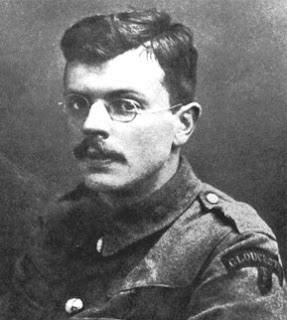 |
| Ivor Gurney |
Gurney was born in Gloucester in 1890 and became a chorister a Gloucester Cathedral where was a pupil of Dr Herbert Brewer and met Herbert Howells, a life-long friend. A scholarship to the Royal College of Music enabled him to study with Stanford, who may have regarded him as unteachable. Gurney's studies were interrupted by the war and Gurney enlisted as a private in the Gloucestershire Regiment. Gurney had a troubled war, he was wounded and there are suggestions that being gassed may have affected his mental health. Always suffering mood swings, and having a breakdown in 1913, Gurney had another one in 1918 but apparently recovered.
He was discharged and seemed to return to health. After the war he returned to the Royal College of Music and studied with RVW. However by 1922 his mental health was again deteriorating and he spent the remaining 15 years of his life (he died in 1937) in mental institutions.
Gurney wrote both poetry and songs, writing hundreds of poems and three hundred songs, though he rarely set his own poetry. His first volume of poetry Severn and Somme was published in November 1917, at a time when Gurney was suffering from the effects of being gassed, as well as the failure of his relationship with a nurse that he met at the hospital to which he was sent.
The poems deal with the twin axes of Gurney's life, the horror of the war and his beloved Gloucestershire, often interleaving the two. He wrote to his friend Marion Scott, 'You cannot think how ghastly the battlefields look under a grey sky. Torn trees are the most terrible things I have ever seen. Absolute blight and curse is on the face of everything'. But he also continued to find inspiration from the Gloucestershire landscape where he had grown up.
His second book of poetry, War's Embers appeared in 1919 to mixed reviews. But it was only in 1954 that Edmund Blunden (at the urging of composer Gerald Finzi) assembled the first published collection of Gurney's poetry.
Quickening: Songs to Texts by English and Welsh Poets comes out on the Navona Records label in the Autumn and features my settings of poems by Ivor Gurney, AE Housmann, Christina Rossetti and Rowan Williams. Please do support our crowd-funding.











No comments:
Post a Comment